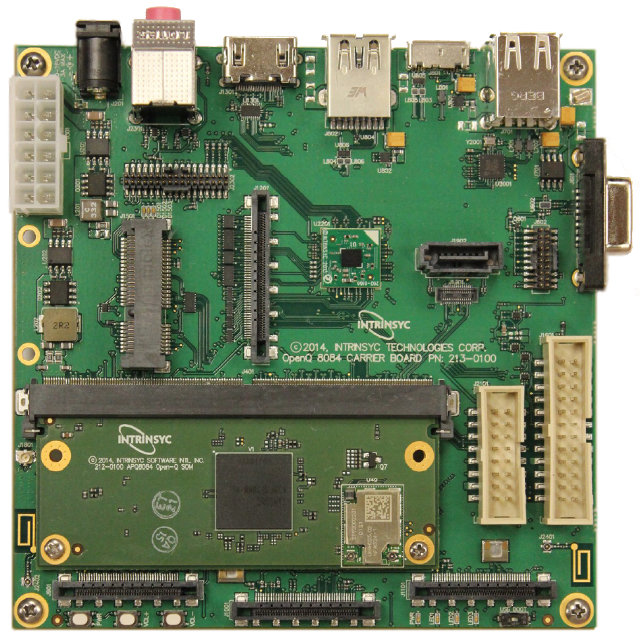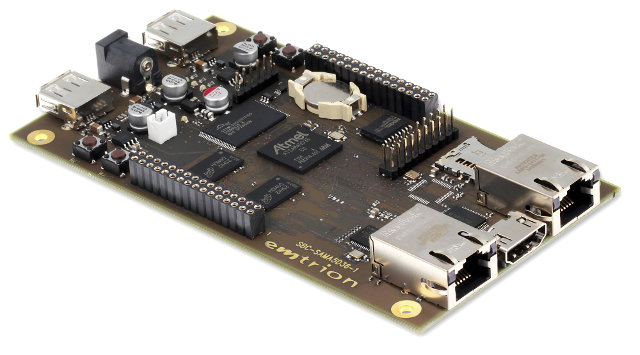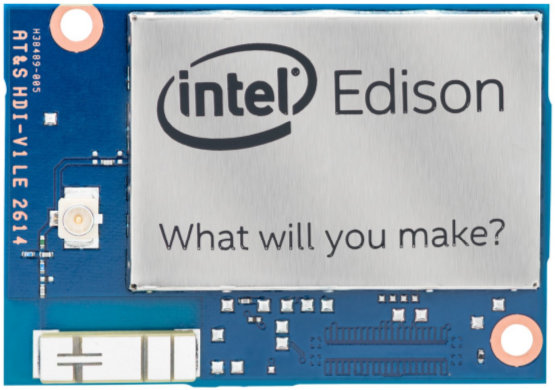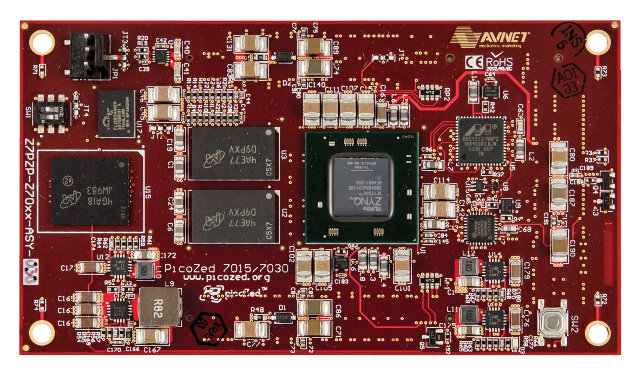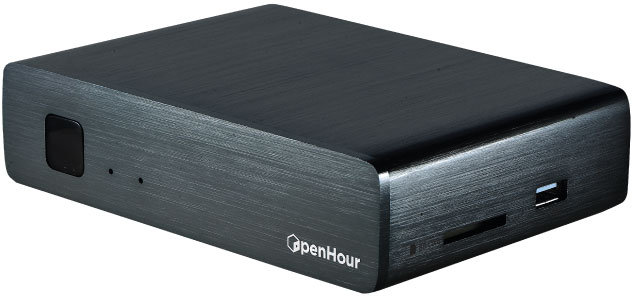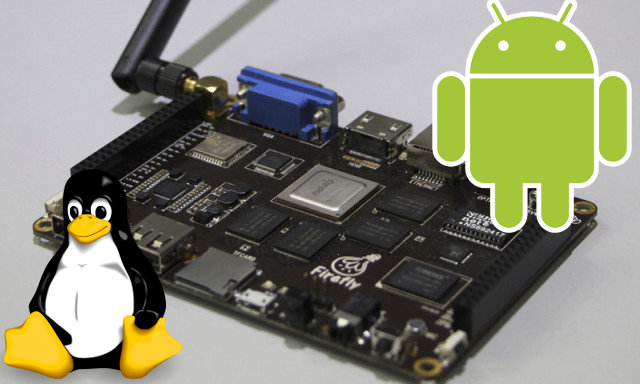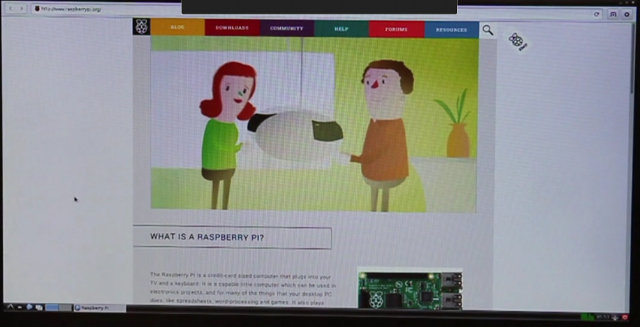Inforce Computing IFC6540 was the first low cost development board powered by Qualcomm Snapdragon 805 processor I discovered a few months ago, but is currently “for pre-approved customers only and have not yet been released to public”. Intrinsyc has now launched their own Snapdragon 805 development kit called OPEN-Q 8084 based on a mini-ITX carrier board, and a SoM with 3GB RAM, and 16GB eMMC. The board target applications include ruggedized tablets, digital signage, government/public safety, medical, robotics, wearable displays, video streaming/conferencing, gaming systems, and in-flight entertainment. Specifications of APQ8084 Open-Q System-on-Module: SoC – Qualcomm Snapdragon 805 (APQ8084) quad core Krait 450 @ 2.5GHz, with Adreno 420 GPU @ 500MHz, Hexagon QDSP6 V5A (600MHz), and two ISPs for up to 55-megapixel stereoscopic 3D System Memory – 3GB PoP LPDDR3 RAM Storage – 16GB eMMC 5.0 flash, expandable to 64GB, micro SD signals, and SATA signals (via MXM connector) Connectivity – […]
Emtrion SBC-SAMA5D36 ARM Cortex A5 Linux Development Board Comes with Dual Ethernet, HDMI Output
A few months ago, I reviewed Atmel Xplained SAMA5D3 development board powered by SAMA5D36 Cortex A5 processor. The kit is supported by the Yocto Project, so I could build and run Poky distribution with a recent Linux kernel (it support mainline), it features Arduino compatible headers, and I found the board to be a nice platform for headless applications, or applications that require an LCD display. However, if you wanted to connect an HDMI display you’d be out of luck, unless you design your own LCD to HDMI add-on board. Emtrion SBC-SAMA5D36 could be an interesting alternative, as it features very similar specifications, but adds an HDMI output port. Emtrion SBC-SAMA5D36 specifications: MPU – Atmel SAMA5D36 single core Cortex-A5 @ 536 MHz System Memory – 256 MB RAM Storage – 512 MB NAND Flash, up to 16 MB NOR Flash, and micro SD Card socket Connectivity – 100Base-TX Ethernet, 10/100/1000Base-TX […]
$50 Intel Edison Board for Wearables Features an SoC with a Dual Core Atom Processor, and a Quark MCU
Intel announced the Edison board for wearables applications last January at CES 2014. When it first came out, it looked like an SD card, but the board look has now drastically changed. Nevertheless, the important point is that Intel Edison is now available, together with various development kits, and runs Linux (Yocto built), as well as an RTOS. With the official release, we’ve also got the full specifications: SoC – Dual-core, dual-threaded Intel Atom (Silvermont) processor (22nm) processor @ 500 MHz and a 32-bit Intel Quark micro-controller @ 100 MHz. Includes 1GB LPDDR3 PoP memory System Memory – 1 GB LPDDR3 (PoP memory) – 2 channel 32bits @ 800MT/sec Storage – 4 GB eMMC (v4.51 spec) + micro SD card connector Connectivity – Dual band 802.11 a/b/g/n Wi-Fi (Broadcom 43340) with either an on-board antenna or external antenna, and Bluetooth 4.0 USB – 1x micro USB connector I/Os: 2x UART […]
PicoZed System-on-Modules are Powered by Xilinx Zynq-7000 ARM + FPGA SoC
After the Zedboard, and the Microzed, here comes PicoZed, a family of system-on-modules (SoM) based on Xilinx Zynq-7000 SoCs featuring a dual core Cortex A9 processor and FPGA fabric. The module also comes with 1GB RAM, 4GB eMMC, Gigabit Ethernet PHY, various user I/O, and more. Target applications include embedded vision, test & measurement, motor control, software-defined radio, and industrial automation. Four modules are available with support for commercial or industrial temperature ranges, all sharing the following specifications: SoC (depending on module) Xilinx Zynq-7010 with two Cortex-A9 cores @ 866MHz, FPGA with 28K Logic Cells Xilinx Zynq-7015 with two Cortex-A9 cores @ 866MHz, FPGA with 74K Logic Cells, 4 transceivers @ 6.25 Gb/s Xilinx Zynq-7020 with two Cortex-A9 cores @ 866MHz, FPGA with 85K Logic Cells Xilinx Zynq-7030 with two Cortex-A9 cores @ 1GHz, FPGA with 125K Logic Cells, up to 4 transceivers @ 12.5 Gb/s System Memory – 1GB […]
iControlHub is An Upcoming XBMC Media Center Powered by Intel Celeron J1900 Processor
Earlier this week, we’ve seen MINIX NEO Z64 mini PC based on Intel Atom Z3735F that will sell for less than $150 in October. If you’d like a low power low cost Intel based fanless mini PC but with a bit more processing power, iControlHub could be an option with an Intel Celeron J1900 Bay Trail quad core processor. Preliminary specifications for iControlHub: SoC – Intel Celeron J1900 processor @ 2.0 GHz (Burst frequency 2.41 GHz) with Intel HD graphics (Max TDP) System Memory – Up to 8GB DDR3 Storage – HDD / SSD via mSATA connector Video Output – HDMI Audio Output – HDMI, optical S/PDIF Connectivity – Gigabit Ethernet, Wi-Fi with two external antennas USB – 2x USB 2.0 host ports, 1x USB 3.0 host port Misc – IR in and out Power Supply – 12V Dimensions – 125 x 125 mm (Board) You must be confused with […]
Cloud Media OpenHour Chameleon Quad Core TV Box Boots Android or Linux from SD Card
Cloud Media, previously known as Syabas, has been selling Popcorn Hour media players based on Linux for several years, but with OpenHour Chameleon the company is about to launch their first Android media player powered by Rockchip RK3288. The device is similar to other RK3288 TV boxes, except it does not come with internal storage at all, and instead boots Android 4.4.2 from a provided 8GB SD card, with later plans to have support for Linux operating systems such as Ubuntu. Another particularity is that they’ll use an aluminum casing for better heat dissipation of the Rockchip RK3288 processor which can get pretty hot… OpenHour Chameleon specifications: SoC – Rockchip RK3288 quad core ARM Cortex A12 / A17 processor with ARM Mali-T764 quad-core 3D GPU supporting OpenGL ES 1.1/2.0/3.0, and OpenCL 1.1 System Memory – 2GB DDR3 Storage – No Internal storage + SD card slot with 8GB card (including […]
Rockchip RK3288 Android 4.4.2 SDK and Schematics Released for Firefly Board
Firefly-RK3288 development board was first announced in July. I still don’t have news about availability nor pricing, but the T-Firefly website launched yesterday. They seem do have a nice Wiki, but unfortunately everything is currently in Chinese, except when you go to the download page. You’ll find firmware upgrade_tool for Linux and Windows, the USB drivers for rooting and firmware update, firmware images (Android 4.4.2, Ubuntu 14.04, and dual boot), the board schematics (PDF), and Android KitKat 4.4.2 SDK with U-Boot, Linux, and Android source code, some documentation, XBMC apk (no source) with H.265 hardware decode support for MP4, MOV and MKV container formats. The SDK is available on Bitbucket. I planned to test it, but unfortunately my network connection is very slow (and unstable) to this server, and I failed to retrieve it with git clone. The company also posted the build instructions in Chinese in their website, but […]
New Optimized Web Browser Released for the Raspberry Pi
If you’ve ever tried to use a Raspberry Pi to browse the web, you must have noticed how frustrating it can be due to the overall sluggishness of the system. But thanks to work by Collaborra, which optimized Epiphany Web browser for the Raspberry Pi, bringing features such as 720p HTML5 hardware video decoding (no flash support), faster loading and scrolling, etc.., the web browsing experience has much improved, although as you’ll see from the video below, it’s still not quite 100% perfect. The key modifications brought to Epiphany Web browser are listed below: More responsive UI and scrolling, even while loading a page Progressive tiled rendering for smoother scrolling Startup is three times faster Avoid useless image format conversions Better YouTube support, including on-demand load of embedded YouTube videos to make page load much faster Hardware decoding and scaling of videos (through gst-omx) Reduction of the number of memory […]


